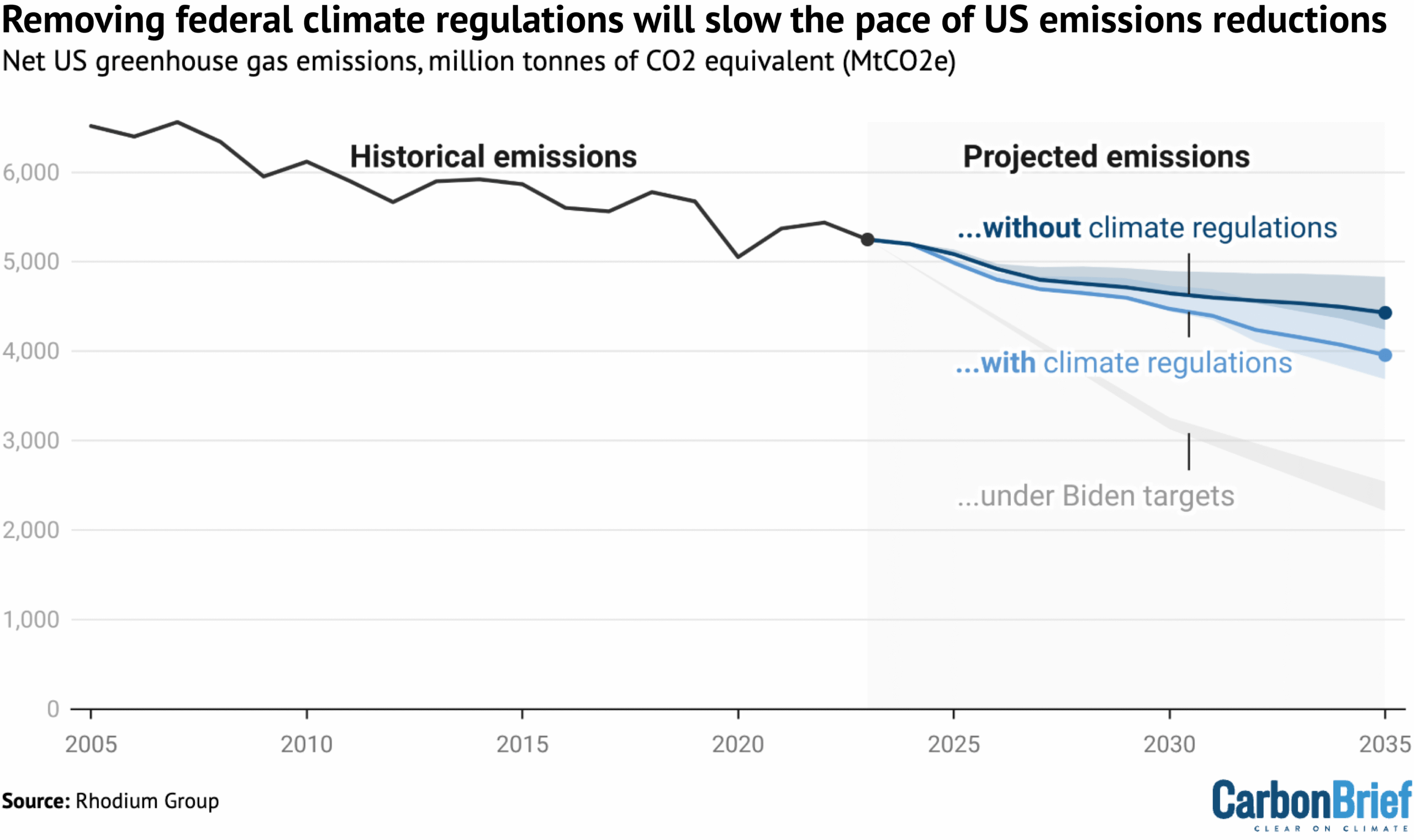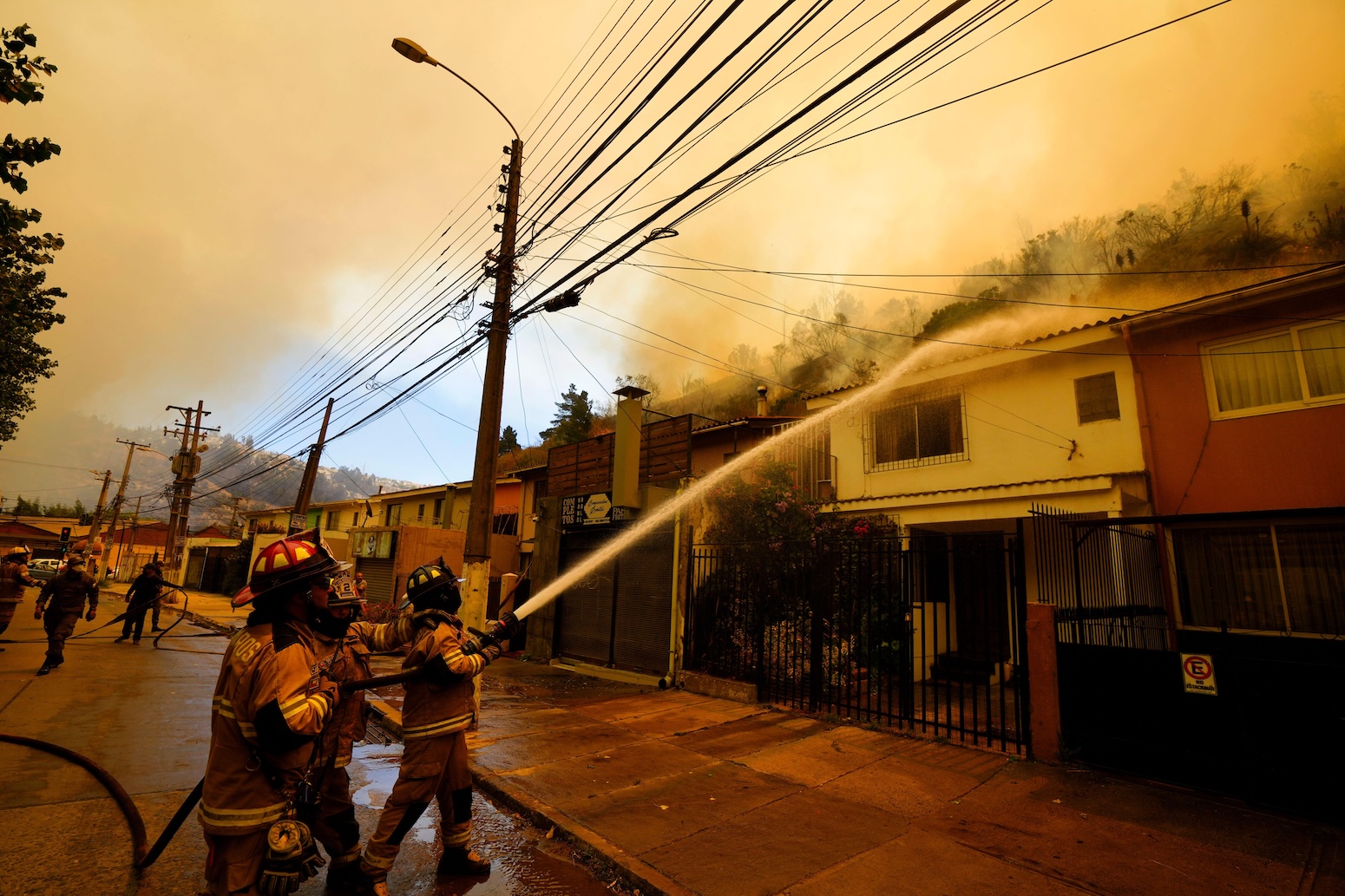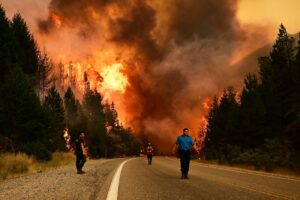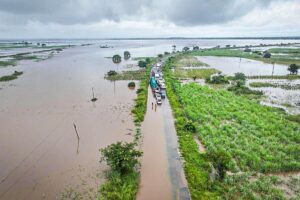Welcome to Carbon Brief’s Cropped.
We handpick and explain the most important stories at the intersection of climate, land, food and nature over the past fortnight.
This is an online version of Carbon Brief’s fortnightly Cropped email newsletter. Subscribe for free here.
Key developments
Drought around the world
GLOBAL DROUGHT: Drought affected 1.84 billion people in 2022 and 2023 – nearly one-quarter of all people on Earth – “the vast majority” of whom live in low- and middle-income countries, the New York Times wrote. The figures come from the UN’s “Global Drought Snapshot” report. The New York Times explained that the droughts “come at a time of record-high global temperatures and rising food-price inflation”, with conflicts such as Ukraine “punishing the world’s poorest people”. The outlet said: “Some of the current abnormally dry, hot conditions are made worse by the burning of fossil fuels that cause climate change.” It added that the onset of El Niño last year “has also very likely contributed” to the heat and drought.
SHIP-SHAPE: Drought is also impacting the flow of global shipping, as “critical shipping delays” have plagued the Panama Canal, Bloomberg reported. The canal handles around $270bn of global trade each year – about 5% of total commerce. “Potential solutions”, the outlet wrote, “include an artificial lake to pump water into the canal and cloud seeding to boost rainfall”. But, it added, it is unclear if either option is feasible – and neither would be able to be implemented quickly. Moller-Maersk, the Danish shipping giant, has announced that it will “turn to rail to move some cargo”, according to Reuters. The newswire added that the Panama Canal Authority is “developing short- and long-term solutions to limit climate anomalies’ impact on the trade route”.
LOOKING FORWARD: The Global Drought Monitor Consortium released its 2023 summary report, which found that the record heat experienced last year “affected the water cycle in various ways”, including by exacerbating drought conditions. Looking forward, the report said, “the greatest risk of developing or intensifying drought” over the next year is in much of central and South America, southern Africa and western Australia. According to the Global Drought Monitor, global precipitation was “close to average” last year, with no clear trend. But, it added, “the number of record low monthly precipitation totals was the highest on the record”. For more on last year’s record heat, see Carbon Brief’s 2023 state of the climate analysis, published last week.
New year, new species
RIGHT ON KEW: From Antarctic rocks to the top of a volcano, scientists at the Royal Botanical Gardens, Kew, discovered 74 new species of plants and fungi in 2023, BBC News reported. Of these, “at least one will probably already have been lost”, the story said. Scientists are calling for the immediate protection of new discoveries that include species of Antarctic fungi and a pair of trees living almost entirely underground in highland Angola. Nevertheless, senior research leader at Kew, Dr Martin Cheek, told BBC News: “The sheer sense of wonder when you realise that you’ve found a species that is totally unknown to the rest of the world’s scientists and, in fact, everyone else on the planet, in many cases, is what makes life worth living.”
ANIMAL INVENTORY: Separately, the Zoological Survey of India declared that 664 new animal species were discovered in 2022, according to a story by Mid-day profiling the wildlife researchers behind these finds. “It is both hopeful and intriguing to know that there is something new in a particular patch of forest…but it is tough not to be worried by changes,” said University of Arkansas researcher Shantanu Joshi, who discovered a rare dragonfly species and gave a local family credit as co-authors of his research. Citizens and communities aiding these discoveries are “a contrast to the grim reality” of having to witness “radical and swift destruction of habitats” first-hand, the story added. But they face “systemic challenges”, including the lack of funding and opportunities and the state of documentation and inventorying in India, the story said.
DEEP-SEA DISCOVERY: Meanwhile, New Scientist reported that four new species of deep-sea octopus were discovered at depths of 3km near hydrothermal vents off the coast of Costa Rica. “It’s like walking in a forest you’ve never been in before, with a flashlight, trying to find a hot spring,” said expedition co-leader Dr Beth Orcutt from the Bigelow Laboratory for Ocean Sciences. Separately, the “largest ever study of ocean DNA” revealed fungi species in the ocean’s “twilight zone” that could yield “new drugs that may match the power of penicillin”, the Guardian reported. And a feature in Hakai Magazine looked at how quickly animals can evolve to adapt to a rapidly changing climate. For Prof Luciano Beheregaray, a molecular ecologist at Flinders University, “hybridisation” is key. He told Hakai: “We could manage populations at risk by actively bringing in genetic material that might help them adapt…It would be better than to sit and watch extinction take place before our eyes.”
Spotlight
Deep-sea disquiet
In this spotlight, Carbon Brief unpacks Norway’s recent decision to allow exploratory seabed mining in its national waters and explains what the next year holds for deep-sea mining approvals.
In December, Norway made headlines around the world as its centre-left minority government struck a deal with two conservative parties to allow companies to explore the seabed of the Arctic Ocean for critical minerals, as covered in Cropped at the time. Last week, the Storting – the Norwegian parliament – officially passed the measure, “against massive criticism from scientists, fisheries organisations and the international community”, EU Reporter wrote.
Seabed mining can involve “hoovering” up rocks called “polymetallic nodules” from the seafloor. These rocks contain metals including manganese, cobalt and nickel, many of which are critical for batteries and other technologies. However, it can also look more like land-based mining – which is “more invasive”, according to Wired.
There are a “huge number of unknowns” associated with seabed mining, Prof David Schoeman, a quantitative ecologist at the University of the Sunshine Coast in Australia, told Carbon Brief last year.
In part, that is because deep-sea habitats are “poorly understood, diverse, fragile and extremely slow to recover from disturbance”, Pepe Clarke, global oceans practice lead at WWF-International, told Carbon Brief. In addition, research previously covered by Carbon Brief has found that seabed mining could negatively impact other important industries, such as fisheries.
At present, the governmental approval covers only exploration for critical minerals, not exploitation of such resources. But, Clarke said: “You don’t explore unless you’re looking for something.”
“Many states view Norway as a sustainable manager of its ocean areas, so what Norway practises and allows in terms of ocean industry is important,” Ida Soltvedt Hvinden of the Fridtjof Nansen Institute told Wired. But it does not directly affect the ongoing negotiations at the International Seabed Authority (ISA), which governs the use of the seafloor in areas beyond any national waters. Twenty-four countries, including the UK, are currently calling for a moratorium on seabed exploration until the risks of environmental harm can be better understood.
There are, essentially, two ways that such a moratorium could come into effect. It could be adopted at the ISA through a formal process. Or, a de facto moratorium could take hold if “a sufficiently large bloc of countries at the ISA committed to withholding support for future mining approvals”, Clarke explained.
Discussions around a seabed exploration moratorium will continue at the ISA this year, with the council scheduled to meet twice and the assembly convening at the end of July. However, Clarke said, it is “unlikely” that the issue will be resolved in the coming year. According to BBC News, a final vote at the ISA is “expected within 24 months”.
News and views
MIXED SIGNALS: Reuters reported that deforestation in the Brazilian Amazon rainforest halved in 2023 compared to 2022, hitting its lowest levels since 2018. The newswire called it “a major win for President Luiz Inacio Lula da Silva in his first year in office”. But, it pointed out, the area cleared last year is still “six times the size of New York City” – underscoring challenges in Lula’s pledge to end illegal deforestation by 2030. Meanwhile, the Financial Times reported that deforestation in the Cerrado savannah in eastern Brazil rose by 43% in the same time period, with campaigners calling it a “major stain” on Lula’s environmental credentials. Speaking to the FT, André Guimarães of the Amazon Environmental Research Institute said: “Unlike the Amazon, where prevention can be done via law enforcement, in the Cerrado, incentives have to be created for landowners to give up their right to deforest.”
POLAR PATHOGENS: Alaska state officials confirmed that a polar bear found dead in October was killed by the “highly pathogenic avian influenza that is circulating among animal populations around the world”, the Alaska Beacon reported. The state veterinarian said that the death was the first-ever such report in a polar bear anywhere in the world. The outlet added that the death “is a sign of the unusually persistent and lethal hold that this strain” has on wild animal populations. At the other end of the world, the first bird flu deaths in elephant and fur seals were confirmed on South Georgia Island, a UK territory in the sub-Antarctic. “Hundreds of elephant seals were found dead” on the island, the Guardian reported, adding that there “have also been increased deaths of fur seals, kelp gulls and brown skua at several other sites”.
OVERSATURATED: Important crop-growing areas of England were hit by “widespread flooding”, leading to “concerns about shortages of carrots and other root vegetables”, according to the Times. “Prolonged rain” during Storm Henk earlier this month resulted in sustained flooding. The newspaper wrote that “saturated ground is a problem for growers because as long as the crop is in the ground, there’s greater risk of it rotting”. Prof Hannah Cloke, a hydrologist at the University of Reading, pointed out that the floods compounded issues brought on by a “very wet autumn”. She told the outlet: “October’s Storm Babet is already likely to have caused big impacts on potato and cereal crops and damaged this year’s harvest.”
SEED CHANGE: After two consecutive years of heatwaves and other extreme weather taking a toll on yields from India’s wheat bowl, government surveys showed that 80% of the “wheat area this year has been sown with climate-resilient and bio-fortified varieties,” the Hindustan Times reported. The 2022 heatwave reduced India’s wheat yield by 4.5% “compared to a year with normal weather”, according to a study by the University of British Columbia quoted in the story. Separately, Mongabay reported on the combined impact of air pollution and climate change on India’s food security. And Context News reported that while past election manifestos have made only “passing references” to climate impacts on farmers, “crop-threatening erratic monsoon rains and heatwaves could make headlines as campaigning starts” in India’s big general election in April.
SNOWLESS SLOPES: Gulmarg, a skiing town in the Indian-controlled part of Kashmir, witnessed a lack of snow on its ski slopes “due to unseasonably dry weather”, CNN reported, despite being one of the world’s highest ski resorts. The region saw an “80% rain deficit” in December, the Associated Press reported, with daytime temperatures “sometimes at least 6C higher than the norm”. The head of the India Meteorological Department’s Kashmir office, Mukhtar Ahmed, told the newswire that in the last few years, “winter has shortened due to global warming”. This has affected hydropower generation, tourism and agriculture, the article reported, forcing “distressed” farmers to change the crops they plant. Ahmed added that “timely snowfall is crucial to recharge the region’s thousands of glaciers” that sustain agriculture and horticulture. Scientists told the Third Pole that snowless winters and more extreme summer rain could become the norm.
GAZA FAMINE: “Pockets of famine” already exist in Gaza according to UN aid officials, the Guardian reported, with parents sacrificing food for their kids, cooking fuel “almost impossible to find” and 25 kilo sacks of flour now six times their pre-war price. However, lack of data on child malnutrition and mortality meant formal criteria for declaring a famine had not been met, the story said. In a joint statement, the World Health Organisation, World Food Programme and UNICEF said new aid routes must be opened to Gaza, more trucks must be allowed in and aid workers must be protected. According to doctors in Gaza, children “weakened by lack of food had died from hypothermia” and babies born to undernourished mothers “had not survived for more than a few days”.
Watch, read, listen
TRACKED CHANGES: In a news feature, Nature examined how scientists are using gene-editing to domesticate wild plants and concerns around the exploitation of Indigenous and traditional knowledge.
GRISLY NEWS: Are US authorities attributing wildlife declines to predators and overlooking climate impacts on biodiversity? A long-read in Grist unpacked how this has played out in Alaska.
NUTS ABOUT CHESTNUTS: In the Atlantic, staff writer Katherine J Wu explored the downfall of the American chestnut tree and scientists’ attempts to restore the species to its native range.
WHAT’S IN A NAME?: An article in Atmos argued that the way humans talk about nature shapes their relationship to it – and asked whether “we [should] be paying more attention to the words we use?”.
New science
Severe 21st-century ocean acidification in Antarctic marine protected areas
Nature Communications
A new study found that even under intermediate warming over the next century, proposed and existing marine protected areas in the Antarctic will experience “severe” ocean acidification. Using a high-resolution model of the ocean, sea ice and biogeochemistry, researchers projected future ocean acidification under four emissions scenarios. They found that pH in the upper 200 metres of the ocean may decline by up to 0.36, and that these declines will be most severe in coastal areas, where organisms are most sensitive to acidification. The researchers “call for strong emission-mitigation efforts and further management strategies to reduce pressures on ecosystems”.
Consistent patterns of common species across tropical tree communities
Nature
Around 1,050 species make up half of the Earth’s 800bn tropical trees, according to new research. The study, with 357 authors, investigated patterns of abundance of common tree species using inventory data for more than one million trees in old-growth tropical forests across Africa, Amazonia, and south-east Asia. The authors found that despite different histories, there were consistent patterns in common tree species across all continents, suggesting that the “fundamental mechanisms of tree community assembly may apply to all tropical forests”. While their findings “should not detract” from the focus on rare and endemic species, the researchers conclude that it “open[s] new opportunities to understand the world’s most diverse forests”.
Living in harmony with nature is achievable only as a non-ideal vision
Environmental Science & Policy
A new study found that “a dynamic relationship with nature is a constitutional right” for citizens of only four out of 193 countries with constitutions in force: Ecuador, Bolivia, the Philippines and São Tomé and Príncipe. The authors reviewed national constitutions and environmental and biodiversity policies to understand whether they aligned with the Kunming-Montreal Global Biodiversity Framework’s vision of “a world living in harmony with nature by 2050”. They argued that while such harmony “has little scope for translation into rational or achievable policy”, it is consistent with legislation that has been increasingly recognising the rights of nature. They concluded by calling on politicians to “shift Earth-centred governance from an aspirational party-political issue to a foundational principle through constitutional reforms with policy implications”.
In the diary
- 16-19 January: 60th Session of the Intergovernmental Panel on Climate Change | Istanbul, Turkey
- 23 January: UN Convention on Biological Diversity first meeting of the informal advisory group on benefit-sharing from the use of digital sequence information on genetic resources | Online
- 28 January: Finland presidential election
- 2 February: World wetlands day
Cropped is researched and written by Dr Giuliana Viglione, Aruna Chandrasekhar, Daisy Dunne, Orla Dwyer and Yanine Quiroz. Please send tips and feedback to cropped@carbonbrief.org
The post Cropped 17 January 2024: Norway’s deep-sea disquiet; Panama drought; New species discovered appeared first on Carbon Brief.
Cropped 17 January 2024: Norway’s deep-sea disquiet; Panama drought; New species discovered
Greenhouse Gases
Cropped 25 February 2026: Food inflation strikes | El Niño looms | Biodiversity talks stagnate
We handpick and explain the most important stories at the intersection of climate, land, food and nature over the past fortnight.
This is an online version of Carbon Brief’s fortnightly Cropped email newsletter.
Subscribe for free here.
Key developments
Food inflation on the rise
DELUGE STRIKES FOOD: Extreme rainfall and flooding across the Mediterranean and north Africa has “battered the winter growing regions that feed Europe…threatening food price rises”, reported the Financial Times. Western France has “endured more than 36 days of continuous rain”, while farmers’ associations in Spain’s Andalusia estimate that “20% of all production has been lost”, it added. Policy expert David Barmes told the paper that the “latest storms were part of a wider pattern of climate shocks feeding into food price inflation”.
-
Sign up to Carbon Brief’s free “Cropped” email newsletter. A fortnightly digest of food, land and nature news and views. Sent to your inbox every other Wednesday.
NO BEEF: The UK’s beef farmers, meanwhile, “face a double blow” from climate change as “relentless rain forces them to keep cows indoors”, while last summer’s drought hit hay supplies, said another Financial Times article. At the same time, indoor growers in south England described a 60% increase in electricity standing charges as a “ticking timebomb” that could “force them to raise their prices or stop production, which will further fuel food price inflation”, wrote the Guardian.
‘TINDERBOX’ AND TARIFFS: A study, covered by the Guardian, warned that major extreme weather and other “shocks” could “spark social unrest and even food riots in the UK”. Experts cited “chronic” vulnerabilities, including climate change, low incomes, poor farming policy and “fragile” supply chains that have made the UK’s food system a “tinderbox”. A New York Times explainer noted that while trade could once guard against food supply shocks, barriers such as tariffs and export controls – which are being “increasingly” used by politicians – “can shut off that safety valve”.
El Niño looms
NEW ENSO INDEX: Researchers have developed a new index for calculating El Niño, the large-scale climate pattern that influences global weather and causes “billions in damages by bringing floods to some regions and drought to others”, reported CNN. It added that climate change is making it more difficult for scientists to observe El Niño patterns by warming up the entire ocean. The outlet said that with the new metric, “scientists can now see it earlier and our long-range weather forecasts will be improved for it.”
WARMING WARNING: Meanwhile, the US Climate Prediction Center announced that there is a 60% chance of the current La Niña conditions shifting towards a neutral state over the next few months, with an El Niño likely to follow in late spring, according to Reuters. The Vibes, a Malaysian news outlet, quoted a climate scientist saying: “If the El Niño does materialise, it could possibly push 2026 or 2027 as the warmest year on record, replacing 2024.”
CROP IMPACTS: Reuters noted that neutral conditions lead to “more stable weather and potentially better crop yields”. However, the newswire added, an El Niño state would mean “worsening drought conditions and issues for the next growing season” to Australia. El Niño also “typically brings a poor south-west monsoon to India, including droughts”, reported the Hindu’s Business Line. A 2024 guest post for Carbon Brief explained that El Niño is linked to crop failure in south-eastern Africa and south-east Asia.
News and views
- DAM-AG-ES: Several South Korean farmers filed a lawsuit against the country’s state-owned utility company, “seek[ing] financial compensation for climate-related agricultural damages”, reported United Press International. Meanwhile, a national climate change assessment for the Philippines found that the country “lost up to $219bn in agricultural damages from typhoons, floods and droughts” over 2000-10, according to Eco-Business.
- SCORCHED GRASS: South Africa’s Western Cape province is experiencing “one of the worst droughts in living memory”, which is “scorching grass and killing livestock”, said Reuters. The newswire wrote: “In 2015, a drought almost dried up the taps in the city; farmers say this one has been even more brutal than a decade ago.”
- NOUVELLE VEG: New guidelines published under France’s national food, nutrition and climate strategy “urged” citizens to “limit” their meat consumption, reported Euronews. The delayed strategy comes a month after the US government “upended decades of recommendations by touting consumption of red meat and full-fat dairy”, it noted.
- COURTING DISASTER: India’s top green court accepted the findings of a committee that “found no flaws” in greenlighting the Great Nicobar project that “will lead to the felling of a million trees” and translocating corals, reported Mongabay. The court found “no good ground to interfere”, despite “threats to a globally unique biodiversity hotspot” and Indigenous tribes at risk of displacement by the project, wrote Frontline.
- FISH FALLING: A new study found that fish biomass is “falling by 7.2% from as little as 0.1C of warming per decade”, noted the Guardian. While experts also pointed to the role of overfishing in marine life loss, marine ecologist and study lead author Dr Shahar Chaikin told the outlet: “Our research proves exactly what that biological cost [of warming] looks like underwater.”
- TOO HOT FOR COFFEE: According to new analysis by Climate Central, countries where coffee beans are grown “are becoming too hot to cultivate them”, reported the Guardian. The world’s top five coffee-growing countries faced “57 additional days of coffee-harming heat” annually because of climate change, it added.
Spotlight
Nature talks inch forward
This week, Carbon Brief covers the latest round of negotiations under the UN Convention on Biological Diversity (CBD), which occurred in Rome over 16-19 February.
The penultimate set of biodiversity negotiations before October’s Conference of the Parties ended in Rome last week, leaving plenty of unfinished business.
The CBD’s subsidiary body on implementation (SBI) met in the Italian capital for four days to discuss a range of issues, including biodiversity finance and reviewing progress towards the nature targets agreed under the Kunming-Montreal Global Biodiversity Framework (GBF).
However, many of the major sticking points – particularly around finance – will have to wait until later this summer, leaving some observers worried about the capacity for delegates to get through a packed agenda at COP17.
The SBI, along with the subsidiary body on scientific, technical and technological advice (SBSTTA) will both meet in Nairobi, Kenya, later this summer for a final round of talks before COP17 kicks off in Yerevan, Armenia, on 19 October.
Money talks
Finance for nature has long been a sticking point at negotiations under the CBD.
Discussions on a new fund for biodiversity derailed biodiversity talks in Cali, Colombia, in autumn 2024, requiring resumed talks a few months later.
Despite this, finance was barely on the agenda at the SBI meetings in Rome. Delegates discussed three studies on the relationship between debt sustainability and implementation of nature plans, but the more substantive talks are set to take place at the next SBI meeting in Nairobi.
Several parties “highlighted concerns with the imbalance of work” on finance between these SBI talks and the next ones, reported Earth Negotiations Bulletin (ENB).
Lim Li Ching, senior researcher at Third World Network, noted that tensions around finance permeated every aspect of the talks. She told Carbon Brief:
“If you’re talking about the gender plan of action – if there’s little or no financial resources provided to actually put it into practice and implement it, then it’s [just] paper, right? Same with the reporting requirements and obligations.”
Monitoring and reporting
Closely linked to the issue of finance is the obligations of parties to report on their progress towards the goals and targets of the GBF.
Parties do so through the submission of national reports.
Several parties at the talks pointed to a lack of timely funding for driving delays in their reporting, according to ENB.
A note released by the CBD Secretariat in December said that no parties had submitted their national reports yet; by the time of the SBI meetings, only the EU had. It further noted that just 58 parties had submitted their national biodiversity plans, which were initially meant to be published by COP16, in October 2024.
Linda Krueger, director of biodiversity and infrastructure policy at the environmental not-for-profit Nature Conservancy, told Carbon Brief that despite the sparse submissions, parties are “very focused on the national report preparation”. She added:
“Everybody wants to be able to show that we’re on the path and that there still is a pathway to getting to 2030 that’s positive and largely in the right direction.”
Watch, read, listen
NET LOSS: Nigeria’s marine life is being “threatened” by “ghost gear” – nets and other fishing equipment discarded in the ocean – said Dialogue Earth.
COMEBACK CAUSALITY: A Vox long-read looked at whether Costa Rica’s “payments for ecosystem services” programme helped the country turn a corner on deforestation.
HOMEGROWN GOALS: A Straits Times podcast discussed whether import-dependent Singapore can afford to shelve its goal to produce 30% of its food locally by 2030.
‘RUSTING’ RIVERS: The Financial Times took a closer look at a “strange new force blighting the [Arctic] landscape”: rivers turning rust-orange due to global warming.
New science
- Lakes in the Congo Basin’s peatlands are releasing carbon that is thousands of years old | Nature Geoscience
- Natural non-forest ecosystems – such as grasslands and marshlands – were converted for agriculture at four times the rate of land with tree cover between 2005 and 2020 | Proceedings of the National Academy of Sciences
- Around one-quarter of global tree-cover loss over 2001-22 was driven by cropland expansion, pastures and forest plantations for commodity production | Nature Food
In the diary
- 2-6 March: UN Food and Agriculture Organization regional conference for Latin America and Caribbean | Brasília
- 5 March: Nepal general elections
- 9-20 March: First part of the thirty-first session of the International Seabed Authority (ISA) | Kingston, Jamaica
Cropped is researched and written by Dr Giuliana Viglione, Aruna Chandrasekhar, Daisy Dunne, Orla Dwyer and Yanine Quiroz.
Please send tips and feedback to cropped@carbonbrief.org
The post Cropped 25 February 2026: Food inflation strikes | El Niño looms | Biodiversity talks stagnate appeared first on Carbon Brief.
Cropped 25 February 2026: Food inflation strikes | El Niño looms | Biodiversity talks stagnate
Greenhouse Gases
Dangerous heat for Tour de France riders only a ‘question of time’
Rising temperatures across France since the mid-1970s is putting Tour de France competitors at “high risk”, according to new research.
The study, published in Scientific Reports, uses 50 years of climate data to calculate the potential heat stress that athletes have been exposed to across a dozen different locations during the world-famous cycling race.
The researchers find that both the severity and frequency of high-heat-stress events have increased across France over recent decades.
But, despite record-setting heatwaves in France, the heat-stress threshold for safe competition has rarely been breached in any particular city on the day the Tour passed through.
(This threshold was set out by cycling’s international governing body in 2024.)
However, the researchers add it is “only a question of time” until this occurs as average temperatures in France continue to rise.
The lead author of the study tells Carbon Brief that, while the race organisers have been fortunate to avoid major heat stress on race days so far, it will be “harder and harder to be lucky” as extreme heat becomes more common.
‘Iconic’
The Tour de France is one of the world’s most storied cycling races and the oldest of Europe’s three major multi-week cycling competitions, or Grand Tours.
Riders cover around 3,500 kilometres (km) of distance and gain up to nearly 55km of altitude over 21 stages, with only two or three rest days throughout the gruelling race.
The researchers selected the Tour de France because it is the “iconic bike race. It is the bike race of bike races,” says Dr Ivana Cvijanovic, a climate scientist at the French National Research Institute for Sustainable Development, who led the new work.
Heat has become a growing problem for the competition in recent years.
In 2022, Alexis Vuillermoz, a French competitor, collapsed at the finish line of the Tour’s ninth stage, leaving in an ambulance and subsequently pulling out of the race entirely.
Two years later, British cyclist Sir Mark Cavendish vomited on his bike during the first stage of the race after struggling with the 36C heat.
The Tour also makes a good case study because it is almost entirely held during the month of July and, while the route itself changes, there are many cities and stages that are repeated from year to year, Cvijanovic adds.
‘Have to be lucky’
The study focuses on the 50-year span between 1974 and 2023.
The researchers select six locations across the country that have commonly hosted the Tour, from the mountain pass of Col du Tourmalet, in the French Pyrenees, to the city of Paris – where the race finishes, along the Champs-Élysées.
These sites represent a broad range of climatic zones: Alpe d’ Huez, Bourdeaux, Col du Tourmalet, Nîmes, Paris and Toulouse.
For each location, they use meteorological reanalysis data from ERA5 and radiant temperature data from ERA5-HEAT to calculate the “wet-bulb globe temperature” (WBGT) for multiple times of day across the month of July each year.
WBGT is a heat-stress index that takes into account temperature, humidity, wind speed and direct sunlight.
Although there is “no exact scientific consensus” on the best heat-stress index to use, WBGT is “one of the rare indicators that has been originally developed based on the actual human response to heat”, Cvijanovic explains.
It is also the one that the International Cycling Union (UCI) – the world governing body for sport cycling – uses to assess risk. A WBGT of 28C or higher is classified as “high risk” by the group.
WBGT is the “gold standard” for assessing heat stress, says Dr Jessica Murfree, director of the ACCESS Research Laboratory and assistant professor at the University of North Carolina at Chapel Hill.
Murfree, who was not involved in the new study, adds that the researchers are “doing the right things by conducting their science in alignment with the business practices that are already happening”.
The researchers find that across the 50-year time period, WBGT has been increasing across the entire country – albeit, at different rates. In the north-west of the country, WBGT has increased at an average rate of 0.1C per decade, while in the southern and eastern parts of the country, it has increased by more than 0.5C per decade.
The maps below show the maximum July WBGT for each decade of the analysis (rows) and for hourly increments of the late afternoon (columns). Lower temperatures are shown in lighter greens and yellows, while higher temperatures are shown in darker reds and purples.
Six Tour de France locations analysed in the study are shown as triangles on the maps (clockwise from top): Paris, Alpe d’ Huez, Nîmes, Toulouse, Col du Tourmalet and Bordeaux.
The maps show that the maximum WBGT temperature in the afternoon has surpassed 28C over almost the entire country in the last decade. The notable exceptions to this are the mountainous regions of the Alps and the Pyrenees.
The researchers also find that most of the country has crossed the 28C WBGT threshold – which they describe as “dangerous heat levels” – on at least one July day over the past decade. However, by looking at the WBGT on the day the Tour passed through any of these six locations, they find that the threshold has rarely been breached during the race itself.
For example, the research notes that, since 1974, Paris has seen a WBGT of 28C five times at 3pm in July – but that these events have “so far” not coincided with the cycling race.
The study states that it is “fortunate” that the Tour has so far avoided the worst of the heat-stress.
Cvijanovic says the organisers and competitors have been “lucky” to date. She adds:
“It has worked really well for them so far. But as the frequency of these [extreme heat] events is increasing, it will be harder and harder to be lucky.”
Dr Madeleine Orr, an assistant professor of sport ecology at the University of Toronto who was not involved in the study, tells Carbon Brief that the paper was “really well done”, noting that its “methods are good [and its] approach was sound”. She adds:
“[The Tour has] had athletes complain about [the heat]. They’ve had athletes collapse – and still those aren’t the worst conditions. I think that that says a lot about what we consider safe. They’ve still been lucky to not see what unsafe looks like, despite [the heat] having already had impacts.”
Heat safety protocols
In 2024, the UCI set out its first-ever high temperature protocol – a set of guidelines for race organisers to assess athletes’ risk of heat stress.
The assessment places the potential risk into one of five categories based on the WBGT, ranging from very low to high risk.
The protocol then sets out suggested actions to take in the event of extreme heat, ranging from having athletes complete their warm-ups using ice vests and cold towels to increasing the number of support vehicles providing water and ice.
If the WBGT climbs above the 28C mark, the protocol suggests that organisers modify the start time of the stage, adapt the course to remove particularly hazardous sections – or even cancel the race entirely.
However, Orr notes that many other parts of the race, such as spectator comfort and equipment functioning, may have lower temperatures thresholds that are not accounted for in the protocol, but should also be considered.
Murfree points out that the study’s findings – and the heat protocol itself – are “really focused on adaptation, rather than mitigation”. While this is “to be expected”, she tells Carbon Brief:
“Moving to earlier start times or adjusting the route specifically to avoid these locations that score higher in heat stress doesn’t stop the heat stress. These aren’t climate preventative measures. That, I think, would be a much more difficult conversation to have in the research because of the Tour de France’s intimate relationship with fossil-fuel companies.”
The post Dangerous heat for Tour de France riders only a ‘question of time’ appeared first on Carbon Brief.
Dangerous heat for Tour de France riders only a ‘question of time’
Greenhouse Gases
DeBriefed 20 February 2026: EU’s ‘3C’ warning | Endangerment repeal’s impact on US emissions | ‘Tree invasion’ fuelled South America’s fires
Welcome to Carbon Brief’s DeBriefed.
An essential guide to the week’s key developments relating to climate change.
This week
Preparing for 3C
NEW ALERT: The EU’s climate advisory board urged countries to prepare for 3C of global warming, reported the Guardian. The outlet quoted Maarten van Aalst, a member of the advisory board, saying that adapting to this future is a “daunting task, but, at the same time, quite a doable task”. The board recommended the creation of “climate risk assessments and investments in protective measures”.
‘INSUFFICIENT’ ACTION: EFE Verde added that the advisory board said that the EU’s adaptation efforts were so far “insufficient, fragmented and reactive” and “belated”. Climate impacts are expected to weaken the bloc’s productivity, put pressure on public budgets and increase security risks, it added.
UNDERWATER: Meanwhile, France faced “unprecedented” flooding this week, reported Le Monde. The flooding has inundated houses, streets and fields and forced the evacuation of around 2,000 people, according to the outlet. The Guardian quoted Monique Barbut, minister for the ecological transition, saying: “People who follow climate issues have been warning us for a long time that events like this will happen more often…In fact, tomorrow has arrived.”
IEA ‘erases’ climate
MISSING PRIORITY: The US has “succeeded” in removing climate change from the main priorities of the International Energy Agency (IEA) during a “tense ministerial meeting” in Paris, reported Politico. It noted that climate change is not listed among the agency’s priorities in the “chair’s summary” released at the end of the two-day summit.
US INTERVENTION: Bloomberg said the meeting marked the first time in nine years the IEA failed to release a communique setting out a unified position on issues – opting instead for the chair’s summary. This came after US energy secretary Chris Wright gave the organisation a one-year deadline to “scrap its support of goals to reduce energy emissions to net-zero” – or risk losing the US as a member, according to Reuters.
Around the world
- ISLAND OBJECTION: The US is pressuring Vanuatu to withdraw a draft resolution supporting an International Court of Justice ruling on climate change, according to Al Jazeera.
- GREENLAND HEAT: The Associated Press reported that Greenland’s capital Nuuk had its hottest January since records began 109 years ago.
- CHINA PRIORITIES: China’s Energy Administration set out its five energy priorities for 2026-2030, including developing a renewable energy plan, said International Energy Net.
- AMAZON REPRIEVE: Deforestation in the Brazilian Amazon has continued to fall into early 2026, extending a downward trend, according to the latest satellite data covered by Mongabay.
- GEZANI DESTRUCTION: Reuters reported the aftermath of the Gezani cyclone, which ripped through Madagascar last week, leaving 59 dead and more than 16,000 displaced people.
20cm
The average rise in global sea levels since 1901, according to a Carbon Brief guest post on the challenges in projecting future rises.
Latest climate research
- Wildfire smoke poses negative impacts on organisms and ecosystems, such as health impacts on air-breathing animals, changes in forests’ carbon storage and coral mortality | Global Ecology and Conservation
- As climate change warms Antarctica throughout the century, the Weddell Sea could see the growth of species such as krill and fish and remain habitable for Emperor penguins | Nature Climate Change
- About 97% of South American lakes have recorded “significant warming” over the past four decades and are expected to experience rising temperatures and more frequent heatwaves | Climatic Change
(For more, see Carbon Brief’s in-depth daily summaries of the top climate news stories on Monday, Tuesday, Wednesday, Thursday and Friday.)
Captured

Repealing the US’s landmark “endangerment finding”, along with actions that rely on that finding, will slow the pace of US emissions cuts, according to Rhodium Group visualised by Carbon Brief. US president Donald Trump last week formally repealed the scientific finding that underpins federal regulations on greenhouse gas emissions, although the move is likely to face legal challenges. Data from the Rhodium Group, an independent research firm, shows that US emissions will drop more slowly without climate regulations. However, even with climate regulations, emissions are expected to drop much slower under Trump than under the previous Joe Biden administration, according to the analysis.
Spotlight
How a ‘tree invasion’ helped to fuel South America’s fires
This week, Carbon Brief explores how the “invasion” of non-native tree species helped to fan the flames of forest fires in Argentina and Chile earlier this year.
Since early January, Chile and Argentina have faced large-scale and deadly wildfires, including in Patagonia, which spans both countries.
These fires have been described as “some of the most significant and damaging in the region”, according to a World Weather Attribution (WWA) analysis covered by Carbon Brief.
In both countries, the fires destroyed vast areas of native forests and grasslands, displacing thousands of people. In Chile, the fires resulted in 23 deaths.

Multiple drivers contributed to the spread of the fires, including extended periods of high temperatures, low rainfall and abundant dry vegetation.
The WWA analysis concluded that human-caused climate change made these weather conditions at least three times more likely.
According to the researchers, another contributing factor was the invasion of non-native trees in the regions where the fires occurred.
The risk of non-native forests
In Argentina, the wildfires began on 6 January and persisted until the first week of February. They hit the city of Puerto Patriada and the Los Alerces and Lago Puelo national parks, in the Chubut province, as well as nearby regions.
In these areas, more than 45,000 hectares of native forests – such as Patagonian alerce tree, myrtle, coigüe and ñire – along with scrubland and grasslands, were consumed by the flames, according to the WWA study.
In Chile, forest fires occurred from 17 to 19 January in the Biobío, Ñuble and Araucanía regions.
The fires destroyed more than 40,000 hectares of forest and more than 20,000 hectares of non-native forest plantations, including eucalyptus and Monterey pine.
Dr Javier Grosfeld, a researcher at Argentina’s National Scientific and Technical Research Council (CONICET) in northern Patagonia, told Carbon Brief that these species, introduced to Patagonia for production purposes in the late 20th century, grow quickly and are highly flammable.
Because of this, their presence played a role in helping the fires to spread more quickly and grow larger.
However, that is no reason to “demonise” them, he stressed.
Forest management
For Grosfeld, the problem in northern Patagonia, Argentina, is a significant deficit in the management of forests and forest plantations.
This management should include pruning branches from their base and controlling the spread of non-native species, he added.
A similar situation is happening in Chile, where management of pine and eucalyptus plantations is not regulated. This means there are no “firebreaks” – gaps in vegetation – in place to prevent fire spread, Dr Gabriela Azócar, a researcher at the University of Chile’s Centre for Climate and Resilience Research (CR2), told Carbon Brief.
She noted that, although Mapuche Indigenous communities in central-south Chile are knowledgeable about native species and manage their forests, their insight and participation are not recognised in the country’s fire management and prevention policies.
Grosfeld stated:
“We are seeing the transformation of the Patagonian landscape from forest to scrubland in recent years. There is a lack of preventive forestry measures, as well as prevention and evacuation plans.”
Watch, read, listen
FUTURE FURNACE: A Guardian video explored the “unbearable experience of walking in a heatwave in the future”.
THE FUN SIDE: A Channel 4 News video covered a new wave of climate comedians who are using digital platforms such as TikTok to entertain and raise awareness.
ICE SECRETS: The BBC’s Climate Question podcast explored how scientists study ice cores to understand what the climate was like in ancient times and how to use them to inform climate projections.
Coming up
- 22-27 February: Ocean Sciences Meeting, Glasgow
- 24-26 February: Methane Mitigation Europe Summit 2026, Amsterdam, Netherlands
- 25-27 February: World Sustainable Development Summit 2026, New Delhi, India
Pick of the jobs
- The Climate Reality Project, digital specialist | Salary: $60,000-$61,200. Location: Washington DC
- Intergovernmental Panel on Climate Change (IPCC), science officer in the IPCC Working Group I Technical Support Unit | Salary: Unknown. Location: Gif-sur-Yvette, France
- Energy Transition Partnership, programme management intern | Salary: Unknown. Location: Bangkok, Thailand
DeBriefed is edited by Daisy Dunne. Please send any tips or feedback to debriefed@carbonbrief.org.
This is an online version of Carbon Brief’s weekly DeBriefed email newsletter. Subscribe for free here.
The post DeBriefed 20 February 2026: EU’s ‘3C’ warning | Endangerment repeal’s impact on US emissions | ‘Tree invasion’ fuelled South America’s fires appeared first on Carbon Brief.
-
Greenhouse Gases7 months ago
Guest post: Why China is still building new coal – and when it might stop
-
Climate Change7 months ago
Guest post: Why China is still building new coal – and when it might stop
-

 Greenhouse Gases2 years ago
Greenhouse Gases2 years ago嘉宾来稿:满足中国增长的用电需求 光伏加储能“比新建煤电更实惠”
-
Climate Change2 years ago
Bill Discounting Climate Change in Florida’s Energy Policy Awaits DeSantis’ Approval
-
Climate Change2 years ago
Spanish-language misinformation on renewable energy spreads online, report shows
-

 Climate Change2 years ago
Climate Change2 years ago嘉宾来稿:满足中国增长的用电需求 光伏加储能“比新建煤电更实惠”
-
Climate Change Videos2 years ago
The toxic gas flares fuelling Nigeria’s climate change – BBC News
-

 Carbon Footprint2 years ago
Carbon Footprint2 years agoUS SEC’s Climate Disclosure Rules Spur Renewed Interest in Carbon Credits









